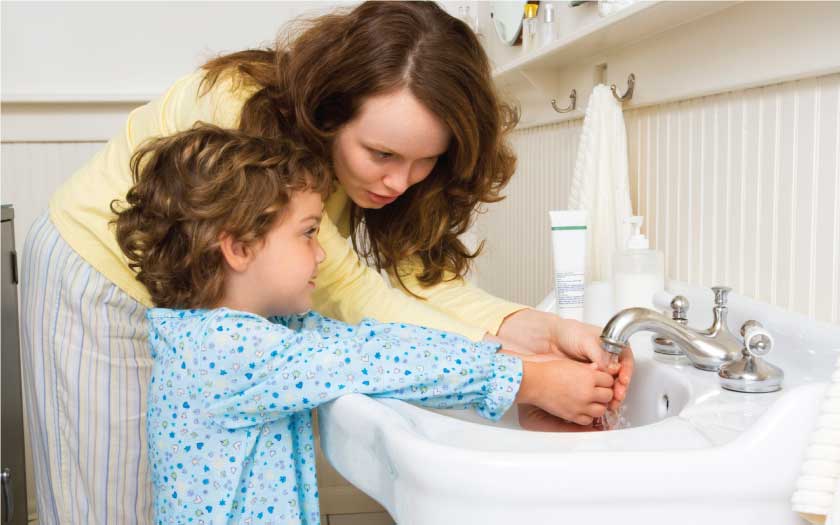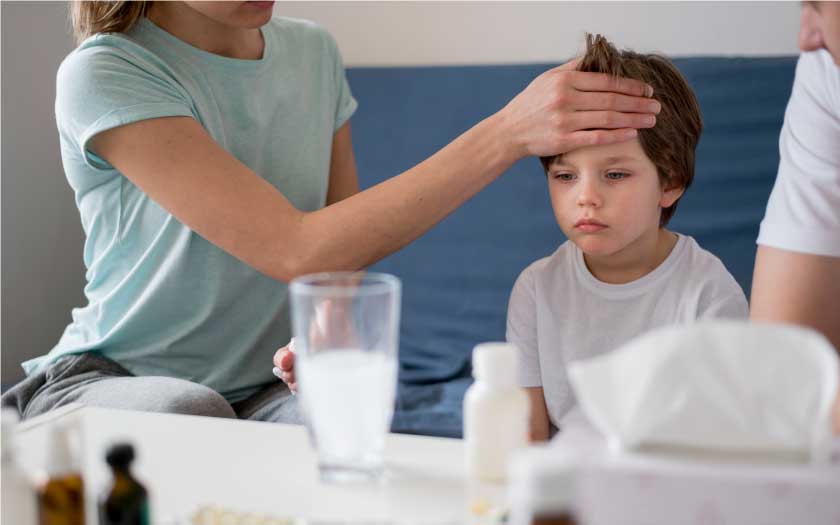Children are known to experience bouts of colds from infancy, notably from the age of six months when the immunity received from their mother begins to wear out. From then on, little ones will have to start to build their immunities to help ward off sicknesses.
Children tend to get up to eight colds a year right up to when they begin to attend preschool. At school-going ages, their bodies would have built up more immunity but many do still get about five to six bouts of colds a year.
Germs — The long and short of it
Some parents wonder if they need to protect their children against germs when the wisdom of the ages indicates that exposure to germs helps kids build immunity. There is much truth in that, but it should not however be taken too literally to the point of deliberately exposing a child to germs. Hence, letting a sick relative sneeze on a child’s face is not wise.
The immune system is apt enough to figure out how to defend the body and fight off germs before it makes the body too sick. The cold and flu viruses however can cause health issues in young bodies. Hence, taking steps to protect little ones from germs is paramount.
Two of the most important achievements in medicine are:
- Getting people vaccinated
- Getting people to wash their hands
– Robert W. Frenck Jr., MD, professor of pediatrics at the Cincinnati Children’s Hospital Medical Center and member of the American Academy of Pediatrics’ Committee on Infectious Disease.
Getting sick at home
A little one does not always need to be outdoors to be susceptible to infection. Babies can become infected even inside their homes. Feeding bottles, utensils, toys, and pacifiers that haven’t been thoroughly disinfected or cleaned can infect a child once it comes to contact with the child’s mouth. One way of minimising this risk is by making sure all baby’s things are cleaned using a sanitiser or steriliser.
Little germ magnets
Kids, especially really young ones, generally can’t help falling sick now and then. The risks of contracting illnesses are high due to their natural inclinations, such as touching dirty objects and then touching or rubbing their eyes or placing their hand in their mouth.
This is where the importance of hand-washing habits come to play. Parents as well as caregivers should make it a priority to ensure that little ones wash their hands regularly to curb the spread of germs from object to object as well as from person to person. Carers should also frequently clean any objects that children might put in their mouths, such as toys.

Mingling with sick peers
Children are bound to be exposed to the cold, cough, or flu once they attend daycare, playschool, or preschool. Being ill doesn’t always stop children from playing with others. If a sick child has a contagious illness, it can easily spread to other kids he or she comes to contact with. This situation is not an easy one to get around for it has to do with other parents’ attitudes and the policy of a daycare, learning center, etc. Having said that, it can be hard to tell whether a child has a contagious illness or not because it may take a while for symptoms to develop and by that time, he or she may already have infected another child. That’s why in some cases, where parents do take the trouble of keeping their sick child home, the child still manages to infect others.
Respiratory transmission
This refers to respiratory droplets from a sick child’s mouth, nose, or lungs which can easily spread to another kid. There are two ways this can happen:
- The virus travels through the air directly onto the other child.
- The virus from a sick child is on a surface or object. When the surface or object is touched by other kids and those kids, in turn, touch their mouth, nose, or eyes without washing their hands, they become infected.
Infections that are commonly spread in these ways between children include colds, influenza, pneumonia, pertussis, and other viral illnesses such as tonsillitis, sinusitis, laryngitis, and bronchitis.
Faecal oral transmission — Yucky but true
The last thing a parent would want to think about is the possibility of poop ending up in their kids’ mouths, but, as careful as parents and caregivers may be, it’s not uncommon for an object or the kid’s hand to become contaminated by minuscule bits of stool. This kind of thing can easily happen at baby swimming pools, water parks, etc. Since children are always touching their mouths, infection is inevitable in this case. Diarrhea, rotavirus, salmonella, tapeworms, pinworms, and hand, foot, and mouth disease (HFMD) have all been known to get passed on this way.
Part of growing up
It’s not unusual when a child falls sick now and then. Sometimes, parents have to accept it as part of growing up and building stronger immune systems. It’s good that most parents tend to do whatever they can to prevent a child from falling sick. However, if their attempts fail, the next best thing parents can do is to manage it correctly as advised by their doctors and just as importantly, prevent it from spreading any further. Regular hand-washing and keeping surfaces and objects clean and sanitised will help a great deal.


